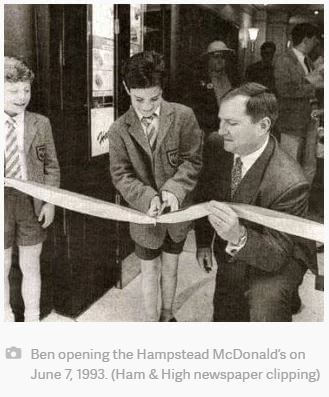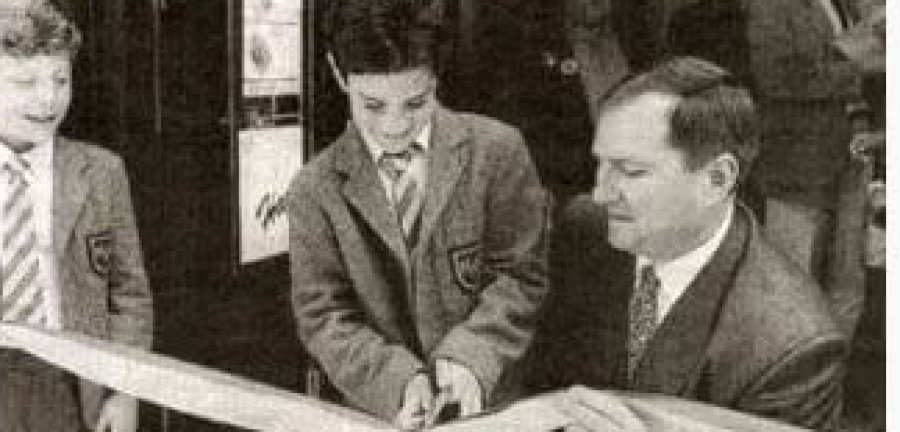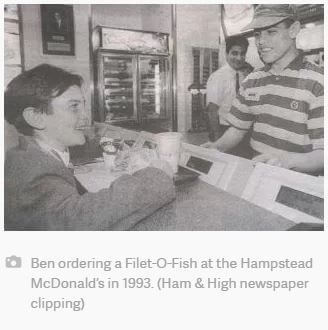When I was 7 years old, I was a shill for McDonald’s. They used me for their own PR gain—and now I am using what I learned to promote veganism. Looking back, it was not my proudest hour.
Sporting our crisp British school blazers and neat little shorts, my classmates and I were assembled for the opening of the first McDonald’s in Hampstead. It was 1993, and as part of the corporation’s big public-relations push, the president of its UK operation was on hand with a phalanx of newspaper reporters and television crews in tow. For a group of impressionable schoolchildren, it was heady stuff.
Hampstead is in a well-to-do part of North London. Opening a restaurant there had been on the ubiquitous fast-food chain’s radar for some time—a desire that was stymied for years by influential local activists. It finally got the go-ahead after agreeing to several concessions, among them a sleek, all-black exterior for the building and a discreet sign that was, back then, quite un-McDonald’s-like.
To drum up positive press for the opening and drown out the naysayers, the company’s marketing department entered the scene. Someone thought it would be a good idea to get Hampstead’s schoolchildren involved, likely as an attempt to woo their overworked mothers. Several months prior to the opening, a competition was held among the local schools, mine included. Our assignment was to write 12 words explaining why we liked the fast-food chain, beginning with, “I like McDonald’s because ….”
Can you guess who won?

Apparently my entry—”I like McDonald’s because there’s a wide variety of food and my pal Ronald thinks so, too”—was so impressive that the judges were OK with it being too long. The entire class was invited to stand behind me while I cut the ribbon at the opening ceremony. The PR team took note that I was a pescatarian at the time, meaning that I ate fish but not other meat. They delighted in serving me a Filet-O-Fish sandwich—on camera.
Seventeen years later, I was studying ethics at college, in particular the writings of Plato, Rawls, and Bentham, the English philosopher who famously held that because animals have the capacity to suffer, they are entitled to the same fundamental rights that are afforded all sentient beings.
That’s when it dawned on me that it’s never too late to throw off the shackles of our consumerist habits—it’s never too late to become a better version of yourself. I decided that going vegan was something easy that I could do that would be enormously beneficial to my health, the planet, and, most importantly, the animals. I’ve now been entirely meat-free for eight years.
I joined PETA not long after. I’d been working in the media department of the organization’s London office for a couple of years when a reporter called to ask if I was the same Ben Williamson who’d cut the ribbon at the opening ceremony of the Hampstead McDonald’s years ago. Did I know, he asked, that it was about to close and become an artisanal French bakery? (I didn’t, but I wasn’t sorry to see it go.)
The reporter asked how I felt, given my subsequent efforts on behalf of animals, about having participated in the ribbon-cutting ceremony. I told him the same thing that I would tell anyone who asked: After learning that McDonald’s—and almost every other corporation in the fast-food industry—pays its suppliers to cram animals into filthy pens and sheds, mutilate them, and ship them to slaughterhouses where their throats are cut, I regretted being a part of that PR stunt. But as a 7-year-old child, I had no idea what it meant for animals.
My brush with McDonald’s was my first exposure to the seductive powers of major corporations. The experience taught me the power that public relations can have—and now I want to use it for the greater good, not evil. Now I work every day to promote a peaceful vegan society.
For me and for public-relations departments around the world, you can never do too much. You’re only as good as your last media campaign, and even if you influence people when they’re young, as McDonald’s did me, there’s no guarantee that they’re going to be loyal to you forever.
Businesses—and by extension, their PR departments—have to remain flexible and be prepared to change with the times. And many have. In the last year alone, Tyson Foods has invested in Beyond Meat, Danone is investing in dairy-free products, Bareburger just announced plans to open a vegan chain, IKEA added vegan meatballs, White Castle has a vegan burger, vegan fast-casual chain Veggie Grill is set for a massive expansion, and Ben & Jerry’s, Breyers, and HäagenDazs offer vegan ice cream.
We are constantly forming and reforming our ideas, which means that at any point, we can become someone completely different—someone better than who we once were. If one consumer could break his shackles, do a 180-degree turn before the age of 30, and go from being a McDonald’s poster child to PETA’s senior international media director, other consumers can adapt, too.
Written by Ben Williamson






